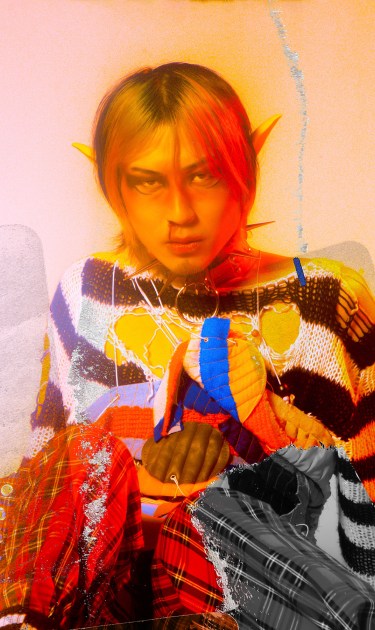The incisive wit of Chenta Tsai is what camp dreams are made of. Under his polemic alias, PUTOCHINOMARICÓN, the Taiwanese-born and Madrid-raised artist has built a career on uproarious takedowns. He debuted in 2018 with the grunge-pop LP Corazón de Cerdo con Ginseng al Vapor and poured sardonic vitriol into early hits “Gente de Mierda” and “Tú No Eres Activista.” Embracing the mutant internet lexicon and lampooning the hypocrisy of a politically correct world, Tsai’s weapon of choice is his own identity. He unspools the complex experiences of a queer, racialized immigrant over a constantly evolving canvas of hyperpop, Y2K-flavored R&B, and majestic orchestral arrangements. And after years of disturbing the peace in the Spanish underground, even his name has become a finely tuned bullshit detector.
“No one is as offended about my name as a white Spaniard,” Tsai says with a chuckle, speaking with Remezcla from his home in Madrid. “I wanted to take back the insults I hear every day. And though I’ve been denied opportunities and stages because of my name, it’s a good filter. Because once I’m at the gig, they’re going to have an even worse time. Now when I walk down the street and hear my name, I don’t know if I’m being recognized or insulted, which is fun.”
Tsai’s family arrived in Spain when he was 10 months old, and throughout most of his life, he grappled with the antagonizing gaze of a historically colonial power that casts immigrants as invaders. Even as he studied violin and piano at the Real Conservatorio Superior de Música de Madrid, a lack of Asian media visibility rendered his pop aspirations as little more than daydreams. His first band, Twink, hit the scene in the early 2010s, embracing brooding Tumblr aesthetics and a bloghouse sound informed by the likes of Mikki Blanco, Grimes, and Brooke Candy. He recalls writing those early songs from the vantage of anger, saying, “My work has always been a battlefield. I’ve never hidden myself or shied away from being ugly or contradictory, because this is ultimately art. Content is for pleasing and art is for annoying.”
He eventually found peace and a new outlook through his family’s enduring relationship with Taiwan, frequently returning to their home country and immersing himself in the local art scene. Tsai went from understanding his identity through fragmentation to connecting with a newfound sense of aspiration and desire, stripping away the lens of exotification and existing in art spaces without the expectation of racial discourse. It’s part of what made his return to Spain so jarring, notably last year, when PUTOCHINOMARICÓN’s Pasadas de Moda LP won the award for Best Música Urbana Recording at the famed indie music fête, Premios MIN.

“It’s a super electropop, indietronica type of album, so winning for Best Música Urbana Recording was hilarious because the only way I could read my inclusion in that category was because I’m a minority,” he remembers, quipping about how he broke the bamboo ceiling. “I’ve been nominated in that category three times and last year I finally won, but I can’t help but take it as a backhanded compliment, as if I were being told, ‘This is as far as you’re going to get.’”
“No one is as offended about my name as a white Spaniard. I wanted to take back the insults I hear every day… Now when I walk down the street and hear my name, I don’t know if I’m being recognized or insulted, which is fun.”
Of course, he’s gone much farther, with remixes and production credits for Pussy Riot, Joe Crepúsculo, Dorian Electra, and Samantha Hudson. The brilliant Pasadas de Moda showcased his astute reads of the zeitgeist, poking fun at fame-hungry influencers on “mamá, quiero ser viral” and shredding artsy nepobabies from ultra-conservative homes on “tu padre es un facha y tu madre una terf.” He also wisely put himself in the line of fire with tracks like “soy un idiota” and “arthoe,” a necessary reminder that even critics are not exempt from criticism, a concept explored further on his surrealist video podcast, BRAINROT.
Airing on RVTE’s Radio 3 Extra, BRAINROT is a collection of absurdist caricatures mocking pop culture phenomena like AI, Emilia Pérez, and queer barista haircuts, delivered in perfect NPR deadpan. Tsai also teases a similarly acerbic tone for his forthcoming album, EDM (Estratégias de Marketing), which will explore the commodification of music and the evolution of artists into content creators. Previous conversations with Spanish musicians Hidrogenesse and Rocío Saiz highlighted how humor is essential for effectively delivering these biting messages, and PUTOCHINOMARICÓN has elevated irony to gloriously pointed heights.

“It’s increasingly harder to stay ironic, and it can even be dangerous,” Tsai cautions, careful not to stray into complete cynicism. “What do you do when the far right becomes a satire of itself? Are they conscious of it or just idiots? So now I’m thinking about meta-irony, being self-critical without being self-destructive. Artists are here to experiment and ask questions, and in some way to be villains, not these kind spirits who are morally perfect.”
“We’re so inundated with nostalgia that we ignore how all the clues about the future are right here right now,” he adds. “I’m very attracted to things that produce a feeling of rejection, which makes me kind of a self-destructive artist. But in that destruction, I can constantly rebuild and redefine myself to better face the future.”
